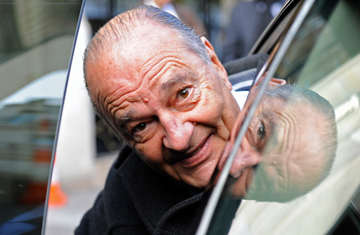
Former French President Jacques Chirac will go on trial in March for "illegal conflict of interest"
Foes of Jacques Chirac were relishing the idea of him being dragged to court in the spring to face corruption charges filed by legal authorities last year. So the news on Monday that the former French President will have to answer to a second batch of corruption allegations must have them dancing in the streets, right? Well, not really. Anyone anticipating Chirac's legal humiliation might want to jam the cork back into the champagne bottle for a while. Odds of the 77-year-old statesman being convicted when the cases go to trial in March are a long shot, experts say, while neither the public nor political actors are at all keen on seeing Chirac disgraced by a guilty verdict.
Long plagued by suspicions of involvement in illegal financing schemes for his Rally for the Republic (RPR) party in the 1990s, Chirac was protected from official investigations by the presidential immunity he enjoyed from 1995 to 2007. Since leaving the Elysée three years ago, however, he has come under the scrutiny of justice authorities who have been pursuing inquiries into a system allegedly operated out of Paris' City Hall in the early 1990s — a period when Chirac was still mayor. Investigators found evidence that municipal funds were used in a manner that benefited the RPR financially, primarily paying the salaries of party workers who had been given fictive City Hall jobs. For that reason, a magistrate investigating the affair ignored a request by the public prosecutor to dismiss the case for lack of convictable evidence, and in October 2009 ordered Chirac and nine municipal aides to stand trial for charges of misuse of public funds. On Nov. 8, another judge probing suspicions of additional financing irregularities similarly rejected his prosecutor's view that the case should be dismissed, and instead decided to put Chirac on trial for "illegal conflict of interest." Both cases will be heard by a Paris court from March 7 to April 8.
But legal experts say the likelihood of Chirac being acquitted is high, due in part to a legal situation Kafka might find amusing. Prosecutors in both cases recommended they be dropped because of insufficient indication of Chirac's guilt. Investigating magistrates ignored that view and sent their findings for trial — meaning the state's refusal to request conviction makes it a de facto ally of the defense.
Meanwhile, most civil plaintiffs have withdrawn their complaints — including the Socialist-led coalition now in power in Paris, which dropped its litigation in exchange for over $3 million from Chirac and his party to reimburse what leftists calculate taxpayers lost to the alleged scheme. And because the investigating magistrates who launched the trials aren't allowed to argue a case against Chirac, the defendant, his lawyers and friendly witnesses will be about the only people whose voices are heard in what will otherwise be a pretty quiet courtroom next spring.
"Unlike most cases where various factors come into play, this one will be determined 100% by what's in the investigative dossier, and whether it clearly demonstrates [Chirac] violated laws," says Didier Rebut, a criminal-law professor at the University of Paris II. "That and the conflicting views about taking it to trial in the first place mean the chances of acquittal are higher than conviction in this case."
Still, Chirac could be unpleasantly surprised. After all, Alain Juppé — a former Prime Minister and deputy to Chirac for most of his reign as Paris mayor from 1977 to 1995 — was convicted in 2005 for his role in the same corruption case that was ordered back to trial Monday. The 14-month suspended prison sentence and yearlong ban from politics that Juppé was handed was a reflection of how confident judges were in the evidence against him. Though Juppé, like Chirac, has always maintained his innocence, Rebut says the precedent of Juppé's conviction "is one reason why a guilty verdict is still feasible, though less probable, for Chirac."
Oddly enough for a President who left office with then record-low approval ratings, Chirac looks to his trial knowing that public opinion — and most of the political class — is hoping he's acquitted. Gaël Slimane, vice CEO of polling agency BVA, says that while the public tired of the stasis under a Chirac administration that put international diplomacy ahead of change and growth at home, his popularity rating has shot to 70% since he left office, as French voters have grown weary of his successor Nicolas Sarkozy's destabilizing reform drive, grating personality and unabashed materialism. In short, the French miss the stately, dignified leader Chirac embodied, with even his political foes sounding nostalgic for the calmness of his reign.
"No one except really militant leftists and Chirac haters want to see this aging man — who since leaving office has again become one of France's most popular political figures — convicted for the kind of finance cheating all parties were up to back then," says Slimane. "The French are more pragmatic than strictly principled, and most people view this as ancient history being dug up for no good purpose."
Meaning, even if the judges surprise the experts and deliver a guilty verdict, Chirac can expect a full pardon from France's court of public opinion. The rest of the world, however, may not be so lenient.
